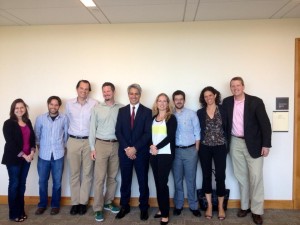On June 19th, Visiting Doctoral Fellow Diego Canabarro joined a group of scholars who debated the Brazilian Internet Bill of Rights with Representative Alessandro Molon (Brazilian House of Representatives). The meeting was held in the Berkman Center for Internet and Society, at Harvard University.
The Draft Bill is a legal framework which has being discussed on an open and collaborative basis since 2009 and aims at declaring the fundamental civil rights in the use of the Internet. It is commonly known as a “Constitution for the Internet”. The text of the bill was crowdsourced through an online platform.
Despite of having strong support of civil society, companies like Google, Yahoo, and Mozilla, International governmental and non governmental organizations, the Bill has faced strong opposition by content and telco in Brazil. A final vote on the matter by the Brazilian Congress has recently been delayed for the sixth time.
In a recent visit to Brazil, Tim Berners-Lee – the father of the Web – affirmed: “With the ‘Marco Civil da Internet’ [name of the Bill in Portuguese], you are on the brink of a remarkable achievement which would be a historic step not just for Brazil but for the world in securing an open and free Web for all. Passing without delay this legislation would cement Brazil’s reputation as a world leader in democracy and social progress.”
According to Representative Molon, ” the Bill has opted to protect society instead of protecting corporate interests. It preserves the Web as it was intended: an open and decentralized network, in which users are the engine for collaboration and innovation. It deals with crucial topics such as privacy, net, freedom of expression, and more. And it has as its foundation the guarantee of human rights, of citizenship and the preservation of the diversity and the social purpose of the web.”
Diego, whose research deals with Internet governance, engaged in and broadcasted the discussions through his Twitter account.
